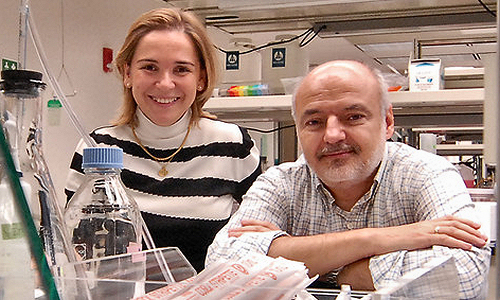Researchers at Sanford-Burnham Medical Research Institute (Sanford-Burnham) have discovered a precise stem cell signaling process that can lead to intestinal tumors if disrupted. The findings add to our understanding of how stem cells give rise to tumors and identify specific stem cell molecules that may be targeted to prevent the onset, progression, and recurrence of intestinal cancers. The results of the study appear online in Cell Reports today.
“Accumulating evidence suggests that cancer stem cells are responsible for cancer initiation, progression, metastasis, recurrence, and drug resistance,” said Jorge Moscat, Ph.D., program director of the Cell Death and Survival Networks Program at Sanford-Burnham. “Our new research provides a better understanding of the signaling cascades that regulate stem cells and is essential for the design of new and more-efficacious therapies for cancer.”
“We have shown that protein kinase C-zeta (PKC-zeta) normally inhibits stem cell activity through downregulation of two signaling pathways: beta-catenin and Yap,” said Maria Diaz-Meco, Ph.D., senior co-author of the paper and professor in the Program. “Previously, our lab showed that PKC-zeta acts as a tumor suppressor that maintains homeostasis of intestinal stem cells. The current study reveals the mechanism by which this occurs.”
The intestine is covered by a single layer of epithelial cells that are renewed every 3 to 5 days. The pool of cells that replace these epithelial cells–intestinal stem cells–needs to be regulated to maintain homeostasis.
“Disturbing the homeostasis of the stem cell pool can go two ways–it can either reduce intestinal epithelial cell regeneration or increase the proliferation of stem cells,” said Diaz-Meco. “Cancer is produced by the accumulation of mutations in critical genes that control central mechanisms of cell growth. Stem cells are a ‘permanent’ population in the intestine and a reservoir for those mutations. Therefore, if stem cell activity is increased, as in the case of intestines deficient in PKC-zeta, then the likelihood of developing tumors is much higher, and when the tumor is initiated it becomes more aggressive.”
Using a genetically engineered mouse model for intestinal cancer, the research team found that this process is kept under control by direct phosphorylation by PKC-zeta of two essential tumor promoters: beta-catenin and Yap.
“Importantly, we confirmed the tumorigenic profiles of PKC-zeta, beta-catenin, and Yap in human colon adenocarcinoma samples. The correlation of human results with our in-vivo mouse studies strongly suggests that Yap and beta-catenin are potential targets of PKC-zeta function and potential targets for new anti-cancer therapies.
“Our results offer new possibilities for the prevention and treatment of intestinal cancers by blocking the pathways that lead to tumors,” said Moscat. “They also highlight a new strategy to promote intestinal regeneration after acute or chronic damage, such as that triggered by chemotherapy and radiation.”
Story Source:
The above story is based on materials provided by The Sanford-Burnham Medical Research Institute.





